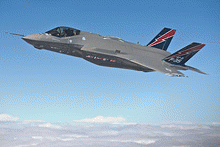Image: Lockheed Martin
Over a decade of US wars of aggression in Afghanistan and Iraq will in the end cost as much as $6 trillion, the equivalent of $75,000 for every American household.
These wars have left the United States heavily indebted and will have a profound impact on the federal government's fiscal and budgetary crises over a protracted period. These are the conclusions of a new report issued by Harvard University's Kennedy School of Government.
Drafted by Linda Bilmes, the Daniel Patrick Moynihan Senior Lecturer in Public Policy at Harvard and a leading expert on financial, budget and veterans issues, the report attributes the largest share of the trillions of dollars in continuing costs to care and compensation for hundreds of thousands of troops left physically and psychologically damaged by the two wars.
"The Iraq and Afghanistan conflicts, taken together, will be the most expensive wars in US history--totaling somewhere between $4 trillion and $6 trillion," Bilmes writes. "This includes long-term medical care and disability compensation for service members, veterans and families, military replenishment and social and economic costs. The largest portion of that bill is yet to be paid."
Another major share of the long-term costs of the wars comes from paying off trillions of dollars in debt incurred as the US government failed to include their cost in annual budgets and simultaneously implemented sweeping tax cuts for the rich.
In addition, huge expenditures are being made to replace military equipment used in the two wars. The report also cites improvements in military pay and benefits made in 2004 to counter declining recruitment rates as casualties rose in the Iraq war.
Biles warns, "The legacy of decisions taken during the Iraq and Afghanistan wars will dominate future federal budgets for decades to come."
Among the most staggering findings of the report is that some 1.56 million US troops--56 percent of all Afghanistan and Iraq veterans--are receiving medical treatment at Veterans Administration facilities and will be granted benefits for the rest of their lives. According to figures cited in the report, fully "one out of every two veterans from Iraq and Afghanistan has already applied for permanent disability benefits."
The report stresses that the official figure of 50,000 American troops "wounded in action" vastly underestimates the real human costs of the two US wars.
It notes that, "One-third of returning veterans are being diagnosed with mental health issues--suffering from anxiety, depression, and/or post-traumatic stress disorder (PTSD)." In addition, over a quarter of a million troops have suffered traumatic brain injuries (TBI), which, in many cases, are combined with PTSD, posing greater problems in treatment and recovery.
Constituting a particularly grim facet of this mental health crisis is the doubling of the suicide rate for US Army personnel, "with many who attempted suicide suffering serious injuries."
Overall, the Veterans Administration's budget has more than doubled over the past decade, from $61.4 billion in 2001 to $140.3 billion in 2013. As a share of the total US budget it has grown from 2.5 percent to 3.5 percent over the same period.
Soaring medical costs for veterans is attributable to several factors. Among them is that, thanks to advancements in medical technology and rapid treatment, soldiers in Iraq and Afghanistan have survived wounds that would have cost their lives in earlier conflicts.
While the US government has already spent $134 billion on medical care and disability benefits for Iraq and Afghanistan veterans, the report estimates that this figure will climb by an additional $836 billion over the coming decades. It notes that the largest expenditures on health care for World War II veterans took place in the 1980s, roughly four decades after the war, and that spending on medical care and disability payments for Vietnam War veterans is still rising.
(Note: You can view every article as one long page if you sign up as an Advocate Member, or higher).





